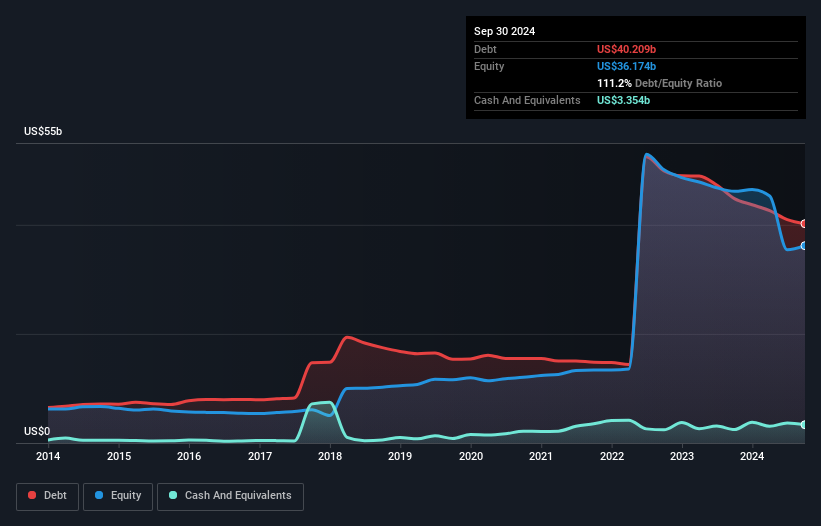- United States
- /
- Entertainment
- /
- NasdaqGS:WBD
Does Warner Bros. Discovery (NASDAQ:WBD) Have A Healthy Balance Sheet?

The external fund manager backed by Berkshire Hathaway's Charlie Munger, Li Lu, makes no bones about it when he says 'The biggest investment risk is not the volatility of prices, but whether you will suffer a permanent loss of capital.' When we think about how risky a company is, we always like to look at its use of debt, since debt overload can lead to ruin. As with many other companies Warner Bros. Discovery, Inc. (NASDAQ:WBD) makes use of debt. But the more important question is: how much risk is that debt creating?
Why Does Debt Bring Risk?
Debt assists a business until the business has trouble paying it off, either with new capital or with free cash flow. If things get really bad, the lenders can take control of the business. However, a more frequent (but still costly) occurrence is where a company must issue shares at bargain-basement prices, permanently diluting shareholders, just to shore up its balance sheet. Of course, the upside of debt is that it often represents cheap capital, especially when it replaces dilution in a company with the ability to reinvest at high rates of return. When we think about a company's use of debt, we first look at cash and debt together.
View our latest analysis for Warner Bros. Discovery
What Is Warner Bros. Discovery's Net Debt?
You can click the graphic below for the historical numbers, but it shows that Warner Bros. Discovery had US$40.2b of debt in September 2024, down from US$44.8b, one year before. However, it does have US$3.35b in cash offsetting this, leading to net debt of about US$36.9b.

A Look At Warner Bros. Discovery's Liabilities
The latest balance sheet data shows that Warner Bros. Discovery had liabilities of US$15.7b due within a year, and liabilities of US$54.5b falling due after that. Offsetting this, it had US$3.35b in cash and US$3.50b in receivables that were due within 12 months. So it has liabilities totalling US$63.3b more than its cash and near-term receivables, combined.
The deficiency here weighs heavily on the US$26.2b company itself, as if a child were struggling under the weight of an enormous back-pack full of books, his sports gear, and a trumpet. So we definitely think shareholders need to watch this one closely. At the end of the day, Warner Bros. Discovery would probably need a major re-capitalization if its creditors were to demand repayment. The balance sheet is clearly the area to focus on when you are analysing debt. But ultimately the future profitability of the business will decide if Warner Bros. Discovery can strengthen its balance sheet over time. So if you want to see what the professionals think, you might find this free report on analyst profit forecasts to be interesting.
In the last year Warner Bros. Discovery had a loss before interest and tax, and actually shrunk its revenue by 5.9%, to US$40b. That's not what we would hope to see.
Caveat Emptor
Importantly, Warner Bros. Discovery had an earnings before interest and tax (EBIT) loss over the last year. Indeed, it lost US$273m at the EBIT level. Considering that alongside the liabilities mentioned above make us nervous about the company. It would need to improve its operations quickly for us to be interested in it. It's fair to say the loss of US$11b didn't encourage us either; we'd like to see a profit. In the meantime, we consider the stock to be risky. There's no doubt that we learn most about debt from the balance sheet. However, not all investment risk resides within the balance sheet - far from it. Case in point: We've spotted 1 warning sign for Warner Bros. Discovery you should be aware of.
If you're interested in investing in businesses that can grow profits without the burden of debt, then check out this free list of growing businesses that have net cash on the balance sheet.
Valuation is complex, but we're here to simplify it.
Discover if Warner Bros. Discovery might be undervalued or overvalued with our detailed analysis, featuring fair value estimates, potential risks, dividends, insider trades, and its financial condition.
Access Free AnalysisHave feedback on this article? Concerned about the content? Get in touch with us directly. Alternatively, email editorial-team (at) simplywallst.com.
This article by Simply Wall St is general in nature. We provide commentary based on historical data and analyst forecasts only using an unbiased methodology and our articles are not intended to be financial advice. It does not constitute a recommendation to buy or sell any stock, and does not take account of your objectives, or your financial situation. We aim to bring you long-term focused analysis driven by fundamental data. Note that our analysis may not factor in the latest price-sensitive company announcements or qualitative material. Simply Wall St has no position in any stocks mentioned.
About NasdaqGS:WBD
Warner Bros. Discovery
Operates as a media and entertainment company worldwide.
Undervalued with mediocre balance sheet.
Similar Companies
Market Insights
Community Narratives




